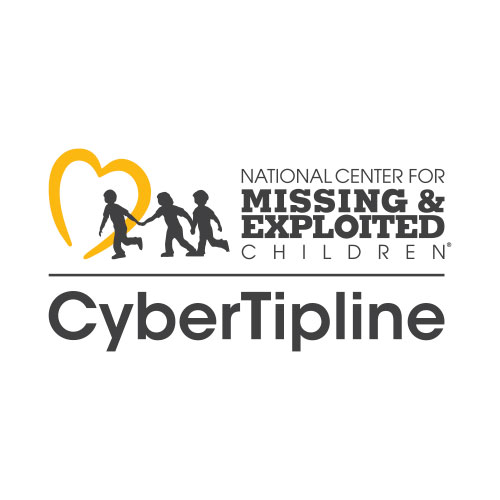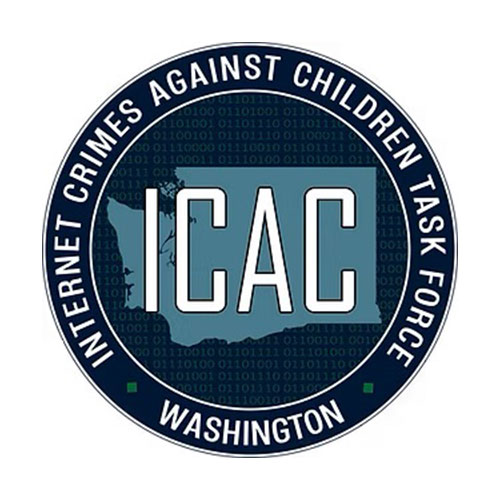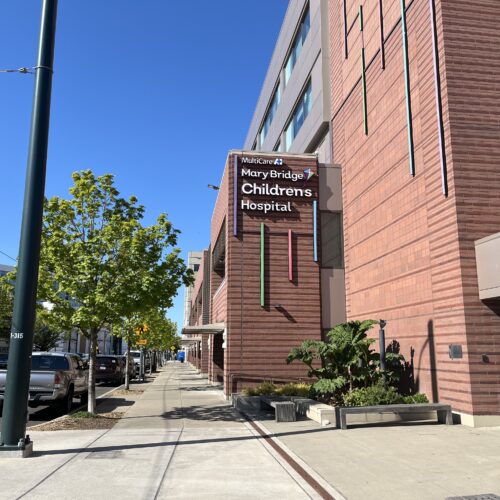
Washington task force investigating crimes against children needs more detectives
Listen
(Runtime 3:49)
Read
Editor’s note: This story contains discussion of sexual abuse of children. NWPB does not identify victims of sexual assault. Survivors and their family members will be identified by their middle initials.
The window to the interview room was covered up, darkening the room. It was a stark contrast to the fifth grade elementary school classroom E had just left.
She was scared and embarrassed. The detective told her she wasn’t in trouble. But she said she just couldn’t talk about what had happened to her when she was in second and third grade.
They took a break. Got some snacks. E cried. Hugged her mom.
“I went to the bathroom, but I ended up breaking down,” E said.
E didn’t know it then, but her case would help detectives push to join a federal task force that investigates crimes against children: the Internet Crimes Against Children, or ICAC.
At the Kennewick Police Department, E sat with a sexual abuse advocate at her side and did the bravest thing. She wrote down her story. All of it.
“She busted that door open, and came running out,” said E’s mom, D. “‘I did it! I did it!’ She was so proud of herself.”
“Yeah,” E, now 20, laughed.
“I was like, ‘Oh, thank goodness,’” D said. “Because then I knew (the detective) could take that and do what he needed to do to help us. That was a rough day.”
“Yeah, it was intense,” E agreed.
“That was not my favorite day at all, but that was the key to getting (the case) where we needed it to be,” D said.
Now, 11 years later, as E recounted that long day, she said she was glad she was able to get her story out. She said she hoped she could help others going through similar sexual abuse.
Kennewick police detective Bill Dramis worked hard on E’s case. After diligent fact-finding and detailed interviews with E, her mother and E’s former stepfather, who abused her and her half-sister, the stepfather pleaded guilty. He is currently serving two life sentences for rape of a child in the first degree and for molestation of a child, according to court documents.
Cases like this stick with you, Dramis said, noting these investigations are teaching moments.
“We have to grow as investigators,” Dramis said. “I think that we’ve evolved because of our experiences with families that we’re still in contact with. … With the task force, we have the ability to stay laser focused.”
The Internet Crimes Against Children Task Force, often referred to as ICAC, is a federal task force that investigates child sexual abuse crimes. When there are enough detectives locally, they can conduct proactive rather than reactive investigations, said Hyrum Stohel, the Richland Police Department sergeant in charge of the region’s ICAC task force, the Southeast Regional ICAC task force, or SER-ICAC.
In proactive investigations, detectives “take the fight to the ‘bad guys,’” Stohel said. “We are very careful. We never put an idea in somebody’s head, but when somebody is blatantly trying to go out and violate children, we’ll go after them, and we’ll find them.”
In southeastern Washington, in addition to Stohel, there are two detectives from the Richland and Kennewick police departments and one Homeland Security investigator. The team is planning to add a part-time detective from the Franklin County Sheriff’s Office starting in January 2025. All over the U.S., there are 61 ICAC task forces.
These sorts of interagency partnerships are vital to investigations, Dramis said.
However, in recent years, the southeast Washington task force has lost staffing and detectives, Stohel said.
“If I had 10 more detectives investigating, I would have them busier than what they would know what to do with,” Stohel said.
The Benton County Sheriff’s Office joined the task force for about five years, leaving about a year ago, Dramis said. The sheriff’s office didn’t respond to interview requests for this story.
“We would love to have some of the other agencies come on board because this is the type of work that’s not going away,” Dramis said.
Neither is the internet. Or apps such as Snapchat and Instagram, which Dramis said are some of the main places underage children and teens are groomed on the internet.
“The fact is, we’ve seen a boom in phone apps that make kids more accessible to adults. It’s kind of easy to hide behind an app or hide behind a created persona, where somebody can be somebody else,” Dramis said. “The internet can be a dark place.”
Dramis said he isn’t sure how many child exploitation cases he’s worked on over a 19-year career. “I’m not even sure how many cases I’m working on right now,” he said as a joke.
These sorts of crimes have only increased since Dramis helped create the southeast Washington task force in 2015.
“I like to refer to cellphones as mobile crime scenes,” he said. “Kids are walking around, chatting to their friends and chatting to their family, but they’re also potentially chatting with somebody that they don’t know.”
Right now, a smaller staff means detectives mostly investigate more reactive cases, like E’s, where tips come to them.
Those cases aren’t as sweeping as recent proactive investigations, like a 2017 well-known online investigation, which led to the arrests of 26 people in five days. At the time, 45 people worked on undercover, online investigations, including from the Washington State Patrol, the southeast regional ICAC task force and prosecuting attorneys.
“This operation potentially saved an unknown number of children who would have otherwise been victimized by these suspects,” said James Mjor, a lieutenant with the Washington State Patrol, during a news conference at the time.
People were arrested from the Tri-Cities, Pendleton and Yakima.
“At the end of that operation, we had to say, ‘Stop.’ If it would have been another day or another two days, there would probably be 10 or 20 more names on that list. The numbers just kept coming,” Dramis said. “Which is why (the task force needs) to exist.”
Sometimes victims and offenders live in different areas or states, Dramis said, which is when the federal connections can help.
With the task force, “we have the ability to utilize resources across the United States,” he said.
Often, federal penalties are stronger, said Vanessa Waldref, the U.S. Attorney for the Eastern District of Washington.
“The use of the internet provides a federal venue in most circumstances,” Waldref said. “Then, that allows potential federal charges for the distribution, the production, or sharing of child pornography or other explicit materials.”
That technology also presents challenges, she said.
“Individuals who are sophisticated in distributing this content and producing this content use a variety of tools to prevent detection,” Waldref said. “So it really requires diligence and learning the new tools and strategies to identify where there is this illicit content.”
The task force has ways to break into phones and decode encryptions.
However, as a parent, Waldref said she worries about her kids having phones every single day. So many apps. So many ways people can pretend to be someone or some age they’re not.
“This is not a safe way to ever meet anyone, to exchange images of any kind,” she said.
Plus, Waldref said, schools “are (putting together) materials to protect kids and to train them that (they) should only communicate online with people (they) know in real life.”
Images last forever, Dramis said. He’s talked to people who were exploited on the internet as children who are now adults.
“That person can be exploited for decades,” he said. “One of the things that they’ve talked about is: they’re walking down the street, and a person is looking at them. Well, why are they looking at them? Because that’s what’s playing in (the victim’s) head.”
That’s why the southeast Washington task force tries to take a holistic approach and helps connect victims with advocates, Dramis said.
“Don’t get me wrong, I think the law enforcement community sometimes does a crap job of this,” he said. “(Hopefully), we’re not just looking for a conviction. We’re looking to have the ability to not only try to give that person justice but also to try to give back the things that have been taken.”
It’s something D said is incredibly important, especially as child exploitation is constantly evolving.
“I wish people understood how important these programs are. They’re just vital,” D said, referring to the task force. “I think that there probably needs to be even more of them because this is not a problem that seems to be going away in society.”
Now, as an adult, E said she heads outdoors when things get to be too much, although those times are easing up. Things are OK now, she said. She’s safe.
“I gotta heal the little me inside more. It’s like, ‘OK, so I’m gonna do more work,” E said. “I wouldn’t change anything. But I don’t let it define me either.”



















